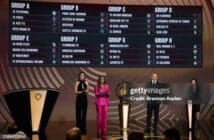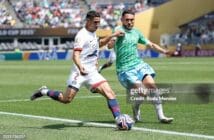
(Getty Images)
After surprising everyone by winning the European Championship in 2016, can Portugal repeat that success at the World Cup in Russia?
Hope One: The Dynamic Duo

It has been years since Portugal had a reliable goalscoring centre-forward, but with the introduction of André Silva in the World Cup qualifiers, the Seleção have found the one to partner with Cristiano Ronaldo. Between the pair they scored 24 of Portugal’s 32 goals in their qualifying campaign.
Although Silva had a subpar season with A.C. Milan scoring only 2 goals in 24 appearances, the 22-year-old did very well in Portugal’s qualifying campaign scoring 9 goals in 10 matches. He became the youngest player to score a hat-trick for Portugal in their 6-0 victory over the Faroe Islands.
For Ronaldo it’s business as usual. Coming off his third consecutive Champions League trophy, the 33-year-old scored 44 goals for Real Madrid this season. As Portugal’s leading goalscorer and appearance maker with 81 goals in 149 matches, he is the focal point for Portugal to have any chance at success this summer. The marksman scored an astounding 15 goals in 9 matches for Portugal to help them qualify for the World Cup.
Hope Two: Fernando Santos

Appointed in September of 2014 Fernando Santos has turned Portugal into a team that is very hard to beat. Portugal’s near flawless campaign of 9 wins in 10 matches only confirmed that they are a force to be reckoned with. Santos has won all but one of the 17 qualifying matches that Portugal have played since he took the reins, which includes an European Championship in 2016 and a third place finish in last years Confederations Cup.
Santos has favored a 4-4-2 formation during his tenure with Portugal, this formation makes the wing-backs key to the attacking game plan. With the wide playmakers often drifting inside, it’s down to the wing-backs to provide width which results in crosses in the direction of the two attackers up top. Some have criticized Santos’ defensive tactics that helped him win the Euros two years ago, though it may not be pretty to watch at times, his tactics have been efficient. The ability to congest the midfield and hit the opposition on the counter-attack worked really well in qualifiers allowing Portugal to score 32 goals and conceding only four in ten matches.
Hope Three: Mixture of Youth and Experience

Portugal’s 23 man squad is a blend of young talent and veteran players.
There are a few changes to the squad that won the Euros two years ago. Andre Gomes and Nani have been omitted from the World Cup squad. Danilo will miss the plane to Russia due to a torn Achilles’ tendon. Renato Sanches who was awarded Best Young Player two years ago didn’t make the cut either. The 20-year-old had a horrible loan spell at Swansea City this season, plagued by injuries the midfielder only made 15 appearances for the Welsh club. But with a wave of young talent at Fernando Santos disposal the future looks bright for Portugal.
One of the bright young stars in Portugal’s squad is Bernardo Silva. The 23-year-old was an important player in his first season with Manchester City. The playmaker made 35 appearances and scored 6 goals in the process. Silva is often played out wide on the right side, but he often drifts inside to play the ball on his favored left foot allowing him to create chances for the two up top. Though Silva is not a productive goal scorer he is becoming a key player for Portugal.
Adding to the list of newcomers to the World Cup squad are Rùben Dias who made his debut against Tunisia at the end of May. Ricardo Pereira who recently signed for Leicester City was handed his first start against Tunisia. To bolster the attack Santos included Sporting teammates Bruno Fernandes and Gelson Martins. Paris Saint Germain’s Gonçalo Guedes is also included, Guedes made two appearances for Portugal back in 2015 at the age of 18. The 21-year-old could be utilized as an alternative to André Silva up top, which Fernando Santos experimented with in their friendly against Algeria resulting with Guedes scoring two goals.
To evenly balance the addition of newcomers to the squad, Santos called up a number of experienced players who participated in the Euros two years ago.
With 108 caps, João Moutinho is Portugal’s second most experienced player behind captain Cristiano Ronaldo. A skillful passer of the ball and workhorse on the field, Moutinho will play a major part in Portugal’s team this summer in the holding midfield position alongside William Carvalho.
At 34, Ricardo Quaresma is one of the oldest players on the squad, expect Quaresma to make an impact coming off the bench, the winger can make something out of nothing. Cédric Soares and Raphaël Guerreiro are respectively still young, but both bring the experience of playing in a major tournament with their involvement in the European final and have all but cemented their places as starting wing-backs for Portugal. Fernando Santos went with veterans in the center of defense, Bruno Alves (36), Pepe (35), and José Fonte (34) are all up there in age, but the problem Santos has is who will partner with Pepe in the back Alves or Fonte? During qualifiers Santos experimented with a number of partnerships, but the one he used most was Pepe and Fonte, but nothing is set in stone.
Fear: Being Optimistic
You hope for the best, but prepare for the worst. Portugal will want to surpass their performance at the last World Cup which saw them knocked out of the Group Stage due to goal difference to a country that will not be in Russia this summer. That country? The United States.
Portugal’s best showing came at the 1966 World Cup where they finished third. Portugal have been considered underachievers in the past, their defeat in the final of Euro 2004 to Greece was a huge disappointment considering Portugal were the host nation.
During their Euro 2016 campaign Portugal were winless in the group stage, drawing all three of their matches. Portugal were lucky to advance to the Round of 16 thanks to being one of the best four third-placed teams in the tournament. It took added extra time to defeat Croatia in that round, they defeated Poland on penalties in the Quarter-finals. It was not until the Semi-finals where they defeated Wales 2-0 they recorded their first victory in regular time. Then of course Eder’s lone goal in the final against host nation France, sealed Portugal’s first ever major trophy.
But can lightning actually strike twice for Portugal?
No longer considered a dark horse with their European triumph, Portugal are expected to make it out of Group B which includes 2010 World Cup winners and Iberian rivals Spain, Morocco, and Iran. Assuming Portugal do get out of their group, they face opposition from Group A which consists of Russia, Saudi Arabia, Egypt, and Uruguay. They should be able to beat any of those teams to advance to the Quarter-finals, but as history has shown Portugal have the tendency to disappoint, hopefully they are able to break that stigma in a weeks time.
Portugal’s first match is against Spain on June 15th at Fisht Olympic Stadium in Sochi.
Apologies, but no results were found for the requested archive. Perhaps searching will help find a related post.2018 World Cup
Portugal
Nothing Found
![Prost International [PINT]](https://prostinternational.com/wp-content/uploads/2021/08/PINTtFontLogoRoboto1536x78.jpg)


